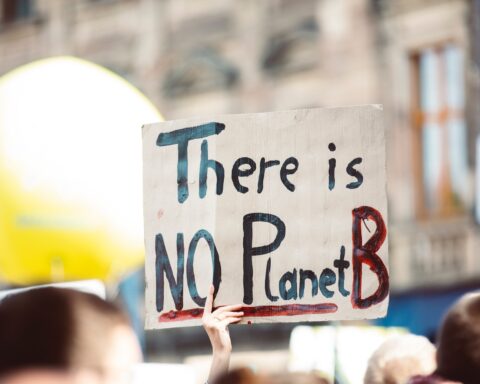Editor’s Note: The editorial staff of Unbound, as well as the members of the Advisory Committee on Social Witness Policy (ACSWP), are aware of massive energy in the church for taking a stand against fossil fuel pollution. One of the potentially most energetic debates coming before the 223rd General Assembly will be about whether to “stay the course” of MRTI’s mission engagement strategy or to divest fully from all fossil fuel polluters.
This article submitted by Steven Webb, ACSWP representative to Mission Responsibility Through Investment (MRTI) and a member of MRTI’s Environmental and Climate Change committee, articulates what it would look like to stay the course. MRTI staff also contributed to the article.
How is PC(USA) strengthening its effort for climate justice?
In 2018, the committee for Mission Responsibility Through Investment (MRTI) joined Climate Action 100+. This newly formed coalition of investors is the largest ever assembled to address a particular issue of corporate behavior. It is a collaborative five-year initiative spanning the globe that focuses on the 100 companies that are the biggest emitters of greenhouse gases. It requires investors, like MRTI through the Board of Pensions and Presbyterian Foundation, to commit to engage as stockholders with companies that are heavy emitters who either:
1) are suppliers of fossil fuels,
2) make equipment to consume it, or
3) burn large amounts of fossil fuels in their business operations.
If companies do not show progress within five years or less of engagement, they will face escalated reputational and financial pressure, including divestment, from the combined weight of the entire Climate 100+ coalition.
Who else is in Climate Action 100+ and what does it do?
Around the world, 279 institutional investors with over $30 trillion in assets under management, including PC(USA), have already signed on to this initiative, representing approximately one-third of the world’s invested assets.
Together, these investors are calling on the boards of companies to:
1) implement a strong governance framework clearly articulating accountability and oversight of climate change risks;
2) take action to reduce greenhouse gas emissions across their value chain; and
3) provide enhanced corporate disclosure that meets the recommendations of the Taskforce on Climate-Related Financial Disclosure, whose framework aims to meet the ambitious goals of the Paris Accords to limit global warming to well under 2 degrees Celsius.
By joining the Climate Action 100+, MRTI is leveraging its work plan with a larger initiative that increases pressure on companies including: Chevron, ExxonMobil, ConocoPhillips, Marathon Petroleum, Valero Energy, Philips 66, Duke Energy, Ford, General Motors, and others to take real action toward addressing climate change, or face possible divestment.
Will this delay MRTI’s consideration of divestment?
No. MRTI will continue with its own, faster program of action, as outlined in its latest report to GA2018. MRTI will use its new Guideline Metrics to evaluate companies’ performance, as mandated by the GA2016—deciding this year (2018) and the next (2019) what changes to push for and with which tools of pressure shareholder resolutions, proxy votes, and divestment from firms that do not improve quickly enough. Climate Action 100+ will enhance MRTI’s leverage, as other investors in the coalition may choose to follow its lead, but it sets no speed limit to deter its members from going faster than the minimum. With the combination of the weight of this global campaign and MRTI’s new Guideline Metrics, it will be easy to differentiate quickly between companies that are moving towards mitigating climate change and those that are continuing disproportionately to contribute to it.
What about the calls by Fossil Free PC(USA) and the Presbyterian Peace Fellowship for immediate and categorical divestment from all firms supplying fossil fuel?
MRTI agrees with FFPCUSA and PPF that climate change is a very serious problem needing urgent action. These groups have played a valuable role in raising consciousness on the issue and in keeping credible the threat of divestment—working on the outside, as MRTI continues with dialogue on the inside. With the federal government weakening its regulatory role, the growing strength of investor engagement is now even more important as an influence on corporate behavior. So now is not the time to sell all our shares and walk away from the table—now is the time to advocate loudly for change, when the government will not. When the time for divestment comes for a reticent company, MRTI will follow the process laid out in the 1984 policy on “Divestment as an Ethical Strategy.”
What specific things does MRTI ask for in its corporate engagement on climate change?
The most frequent requests involve getting the firm to make and publish its plans for adjusting production and investment (exploration, etc.) to the coming world where energy demand is reduced to levels in line with the Paris Accord (even though the US government has dropped its participation). These plans are more than mere talk, since SEC regulations require accurate information to go to investors.
MRTI also asks for disclosure of lobbying expenses, directly or through trade associations, that would press for changes in emission standards and other policies affecting climate and environment. MRTI can make such requests for transparency only as long as it is a stockholder.
Getting our huge economy to pivot away from its dependence on fossil fuel consumption is a large and complex process, and MRTI’s pressure for progress, amplified as part of a large shareholder coalition like Climate Action 100+, can help turn this big ship around.
***
This debate will play out further in the discussion of certain resolutions before the Environmental Issues committee of the 223rd General Assembly. See Unbound’s backgrounder on these resolutions (with links), or go to pc-biz.org to look up each individually.
 Author Bio: Dr. Steve Webb is a ruling elder at United Christian Parish, Reston VA, which is a multi-denominational church uniting PC(USA), United Methodist, United Church of Christ, and Christian Church (Disciples of Christ). Steve is an economist, with degrees from Yale (BA) and the University of Chicago (PhD). He worked for many years on international development issues at the World Bank, retired from there, and still does consulting with them and other development organizations.
Author Bio: Dr. Steve Webb is a ruling elder at United Christian Parish, Reston VA, which is a multi-denominational church uniting PC(USA), United Methodist, United Church of Christ, and Christian Church (Disciples of Christ). Steve is an economist, with degrees from Yale (BA) and the University of Chicago (PhD). He worked for many years on international development issues at the World Bank, retired from there, and still does consulting with them and other development organizations.






Unbound Social